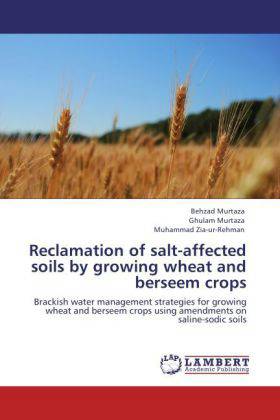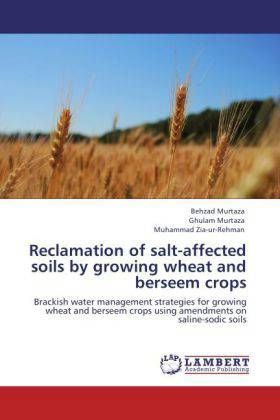
- Afhalen na 1 uur in een winkel met voorraad
- Gratis thuislevering in België vanaf € 30
- Ruim aanbod met 7 miljoen producten
- Afhalen na 1 uur in een winkel met voorraad
- Gratis thuislevering in België vanaf € 30
- Ruim aanbod met 7 miljoen producten
Zoeken
Reclamation of salt-affected soils by growing wheat and berseem crops
Brackish water management strategies for growing wheat and berseem crops using amendments on saline-sodic soils
Behzad Murtaza, Ghulam Murtaza, Muhammad Zia-ur-Rehman
Paperback | Engels
€ 48,45
+ 96 punten
Omschrijving
Pakistan has the largest contiguous gravity flow canal irrigation system, but is falling short of good-quality water due to increased cropping intensity and increased demands for households and industry over the years. In Pakistan the agriculturally important areas are arid or semi-arid where freshwater supplies are limited to meet crop water requirements especially at critical stages. This shortage is being fulfilled by exploiting groundwater resources which is mostly brackish in nature. We evaluated the growth response of wheat and berseem crops to brackish water during reclamation of dense saline-sodic soils. The cyclic irrigation of CW and TW along with the application of gypsum @ 100% SGR or FM or with auger hole 60 m-2 refilled with gypsum and rice husk (1:1 ratio) remained better in lowering ECe, pHs and SAR and produced maximum grain and straw yields of wheat as well as berseem fodder. Overall, it was concluded that low quality waters could be exploited for irrigation on marginal salt-affected soils.
Specificaties
Betrokkenen
- Auteur(s):
- Uitgeverij:
Inhoud
- Aantal bladzijden:
- 108
- Taal:
- Engels
Eigenschappen
- Productcode (EAN):
- 9783847332473
- Verschijningsdatum:
- 6/01/2012
- Uitvoering:
- Paperback
- Afmetingen:
- 152 mm x 229 mm
- Gewicht:
- 168 g

Alleen bij Standaard Boekhandel
+ 96 punten op je klantenkaart van Standaard Boekhandel
Beoordelingen
We publiceren alleen reviews die voldoen aan de voorwaarden voor reviews. Bekijk onze voorwaarden voor reviews.











